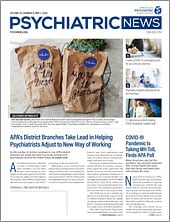Women who have endometriosis have a higher risk of mental illnesses such as depression, anxiety, personality disorders, and substance use disorders (SUDs), suggests a study in the American Journal of Obstetrics and Gynecology. The study also revealed that the association may be bidirectional: Women who have depression, anxiety, or other mental illnesses may have a higher risk of endometriosis.
The study is the first to find such bidirectionality, said first author Menghan Gao, M.Sc., a Ph.D. candidate at the Karolinksa Institute in Stockholm.
“Since there are known diagnostic delays for both endometriosis and psychiatric disorders, we were afraid that only testing in a one-way direction for these potential comorbid disorders may miss some important associations,” Gao told Psychiatric News.
Gao and her colleagues analyzed data from several Swedish registers to follow all women who were born in Sweden between 1973 and 1990 and were diagnosed with psychiatric disorders and endometriosis between age 14 years and the year 2016. They found that women with a previous diagnosis of endometriosis had higher rates of bipolar disorder, depressive disorders, anxiety and stress-related disorders, eating disorders, SUDs, personality disorders, and attention-deficit/hyperactivity disorder (ADHD) compared with women who did not have endometriosis. The greatest risk appeared to be for SUDs and depressive disorders: Women with endometriosis had nearly twice the rate of these conditions than their peers without endometriosis.
Women with a history of psychiatric disorders were more likely than those without such a history to be later diagnosed with endometriosis. Those with anxiety and stress-related disorders had nearly twice the rate of endometriosis as those without these disorders. Those with a history of personality disorders, ADHD, or depressive disorders were also more likely to have endometriosis than those without such a history.
Gao noted that although previous studies have shown an association between endometriosis and depression, anxiety, and stress-related disorders, this study is believed to be the first to demonstrate an association between endometriosis and affective psychotic disorders, eating disorders, SUDs, personality disorders, and ADHD.
“These findings warrant further investigation, as they can give new insights as to the [causes] of endometriosis as well as mental disorders,” Gao said. “For example, there could be common environmental risk factors for endometriosis and mental disorders, shared genetic susceptibility, or common epigenetic factors.”
The researchers wrote that the psychological and physical suffering caused by endometriosis could amplify mental distress and that medications used to treat endometriosis may influence mental health. They also stated that women with psychiatric disorders are already receiving health care services, which may increase detection of endometriosis, and that undiagnosed symptoms of endometriosis, such as pain that causes psychological distress, may be misdiagnosed as psychiatric disorders.
Overall, the results show that women with endometriosis have a complex clinical picture that requires a multidisciplinary approach to care, said senior author Kyriaki Kosidou, M.D., Ph.D., a psychiatrist at the Karolinksa Institute.
“Perhaps a more in-depth assessment of their mental health status and somatic symptoms could help … avoid the overdiagnosis of mental health disorders when pain is the underlying cause of distress,” Kosidou said. “On the other hand, [because] women with mental health conditions are more likely to have endometriosis, somatic complaints such as pain should not be easily disregarded as psychological in origin.”
Maureen Sayres Van Niel, M.D., a reproductive psychiatrist in Cambridge, Mass., can vouch for the clinical complexity of these patients.
“Frequently, I am referred patients from my physician colleagues for evaluation for a psychiatric disorder after their medical workup for chronic pelvic pain was negative. A number of those patients actually had endometriosis that had not been diagnosed,” said Van Niel, who is the APA Assembly’s representative to the Caucus of Women Psychiatrists and chair of the Assembly Committee of Representatives of Minority/Underrepresented Groups. She was not involved in this study.
Van Niel said that psychiatrists should keep two things in mind when working with women who have endometriosis.
“First, we should treat them in a multidisciplinary way. That would involve taking a thorough OB/GYN and family history in our initial evaluation, working closely with our OB/GYN colleagues, and keeping abreast of the medications our patients are taking for [endometriosis] and the medication’s association with psychiatric disorders,” Van Niel said.
“Second, endometriosis can be a terribly difficult disease to live with, and we will be, with others, a significant source of compassionate support in treating the psychiatric problems that either coexist or result from the disorder, including assisting our patients in seeking diagnosis and treatment despite the difficulties,” she added.
This study was supported by funding from the Stockholm Region, the China Scholarship Council, the Swedish Council for Working Life and Social Research, and the Swedish Research Council. ■
“Psychiatric Comorbidity Among Women with Endometriosis: Nationwide Cohort Study in Sweden” is posted
here.

